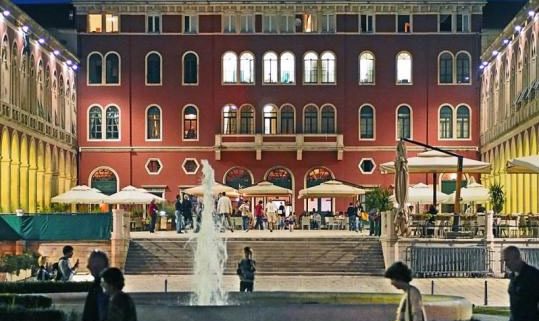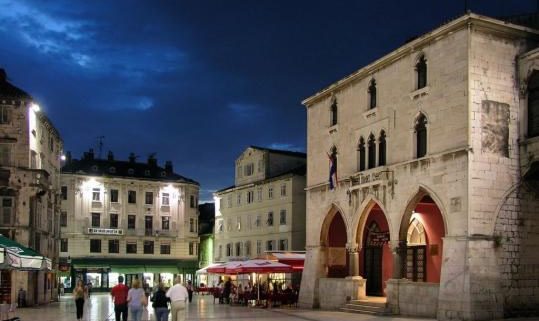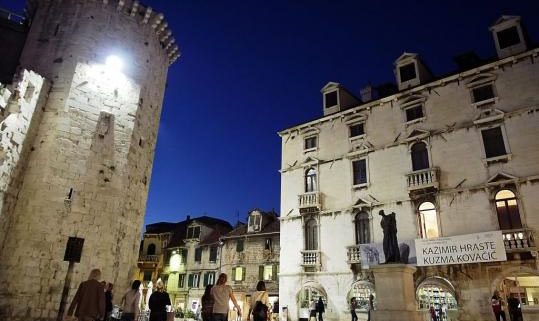Plätze

Der Platz Prokurative
Prokurative oder amtlich der Platz der Republik, ist ein großer Platz der sich westlich von der Uferpromenade Riva befindet und wie auch der Markusplatz in Venedig von drei Seiten mit neo-rennaissancenen Gebäuden mit Bögen umgeben ist, nach denen der Platz auch seinen Namen im Volksmund bekam. Der Platz ist nur in Richtung Süden offen und bietet einen herrlichen Ausblick auf den Hafen und die Uferpromenade.
Den Bau begann in der Mitte des 19. Jahrhunderts einer der bekanntesten Bürgermeister aus der Geschichte dieser Stadt, Antonio Bajamonti, der hiermit zeigen wollte wie sich die Stadt Split in ihrem Wesen an italienische Traditionen anlehnt. Deshalb auch die Kolonnade wie in Venedig und die Reliefs über den Fenstern, die auf Antike und rennaisancene Einflüsse weisen. Bajamonti hat auf seinem Platz damals auch ein großes Theater eingerichtet, das aber einem Brand zu Opfer fiel.
Der Platz hat sich schon seit langem als ausgezeichnete Kulisse und Bühne für zahlreiche diverse Kulturveranstaltungen erwiesen, vor allem das traditionelle Split Musikfestival und die dortigen Cafés und Restaurants machten den Platz auch zu einem beliebten Treffpunkt der Einwohner. Bestandteil des Platzes ist auch ein von ihm südlich gelegenes Plateau, auf dem sich bis 1947 eine große, neoklassizistische Fontäne befand, die von der kommunistischen Regierung abgerissen wurde, wegen angeblicher Erinnerung an Zusammenarbeit mit der italienischen Regierung in Split und Dalmatien.


Pjaca
Der Platz Pjaca (offiziell der Volksplatz, kroatisch Narodni trg, noch ein Platz den niemand in Split nach dem amtlichen Namen nennt) wird zum ersten Mal im 13. Jahrhundert als Platz des hl. Laurentius erwähnt und formt den ersten besiedelten Teil der Stadt Split außerhalb des römischen Diokletianspalastes, an dessen westlicher Seite sich dieser Platz befindet. Schon Jahrhunderte lang ist der Platz Pjaca der Mittelpunkt des städtischen Leben, hier tagten die Stadthäupter im alten gotischen Rathaus – heute einer Kunstgalerie, in den bis heute wunderbar erhaltenen Palästen um den Platz wohnten die Adeligen der Stadt, wie die Familien Cambi, Pavlović, Nakić, Ciprianis, Karepić… Hier befindet sich eine der ältesten, noch immer geöffneten Buchhandlungen namens Morpurgo, in ihrer ursprünglichen Form seit 1861 erhalten, im hiesigen Stadtcafe Central in dem sich traditionell die Intellektuellen der Stadt trafen wurde der Tourismus in Split geboren, mit dem damaligen Hotel Troccoli. Im Platz Pjaca befindet sich schon seit Jahrhunderten auch die große Stadtuhr, einmalig wegen ihren 24 Ziffern, anstatt der üblichen 12 und in den umliegenden Cafés und Restaurants trifft man sich gerne bis heute mit Freunden und Bekannten oder nur um sich der Öffentlichkeit zu präsentieren, vielleicht auch um die Neuigkeiten in der Stadt auszutauschen. Jedes der Gebäude am Platz erzählt eine eigene Geschichte, jedes Gebäude ist Zeuge seiner Zeit, der Geschichte und des Geistes der Stadt. So war das früher, so ist es auch heute als der Platz zu einem der wichtigsten Punkte bei der Besichtigung der Altstadt wurde, den jetzt Besucher genauso gerne wie ihre Gastgeber genießen.


Der Obstplatz - Voćni trg
Ob Sie es glauben oder nicht, doch auch dieser Platz, vielleicht einer der schönsten der Stadt, ist unter den Einheimischen weniger nach seinem offiziellen Namen – Platz der Gebrüder Radić bekannt. Seinen „Volksnamen“ verdankt der Platz der Tatsache, dass sich hier früher ein bunter, lebhafter Obstmarkt befand, auf dem Bauernfrauen der Umgebung ihr Obst anpriesen. Auf dem daneben liegenden Platz, im Westen, wurde Gemüse verkauft.
Es befinden sich auch einige Sehenswürdigkeiten auf diesem nicht so großen Platz der reges Leben aufweist mit seinen Cafés, Restaurants und schönen Läden und auf dem auch oft diverse spezialisierte Märkte veranstaltet werden. In die Augen sticht sicher zuerst der imposante, achteckige venezianische Turm, als Überbleibsel einer ehemaligen Festung aus dem 15. Jahrhundert, errichtet zum Schutz und Abwehr der damaligen kleinen Stadt. Gegenüber des Turmes befindet sich der prunkvolle Palast der alten Familie Milesi aus dem 17. Jahrhundert, mit seiner wunderschönen Barockfassade, einem der schönsten Beispiele dieses Baustils in ganz Dalmatien. Inmitten des Platzes erhebt sich das Denkmal des Vaters der kroatischen Literatur, dem splitter Marko Marulić, einem der wichtigsten Intellektuellen der Stadt des 15. Jahrhunderts. Der Autor dieser Plastik, wie auch einiger anderer in der Stadt war Ivan Meštrović. Dies ist natürlich nicht alles, denn jeder Stein auf dem Obstplatz, wie auch auf den anderen alten Plätzen der Stadt erzählt von der Geschichte die er erlebte. Deshalb haben die Plätze der Altstadt, wie Pjaca und der Obstplatz eine besondere Stellung in den Herzen der Einwohner der Stadt Split. Es wundert dann auch nicht, dass gerade dieser Platz der Mittelpunkt einer der bekanntesten und beliebtesten TV-Serien über die Stadt Split „der Große Ort – Velo misto“ war.


 Deutsch
Deutsch Hrvatski
Hrvatski English
English Italiano
Italiano Français
Français

